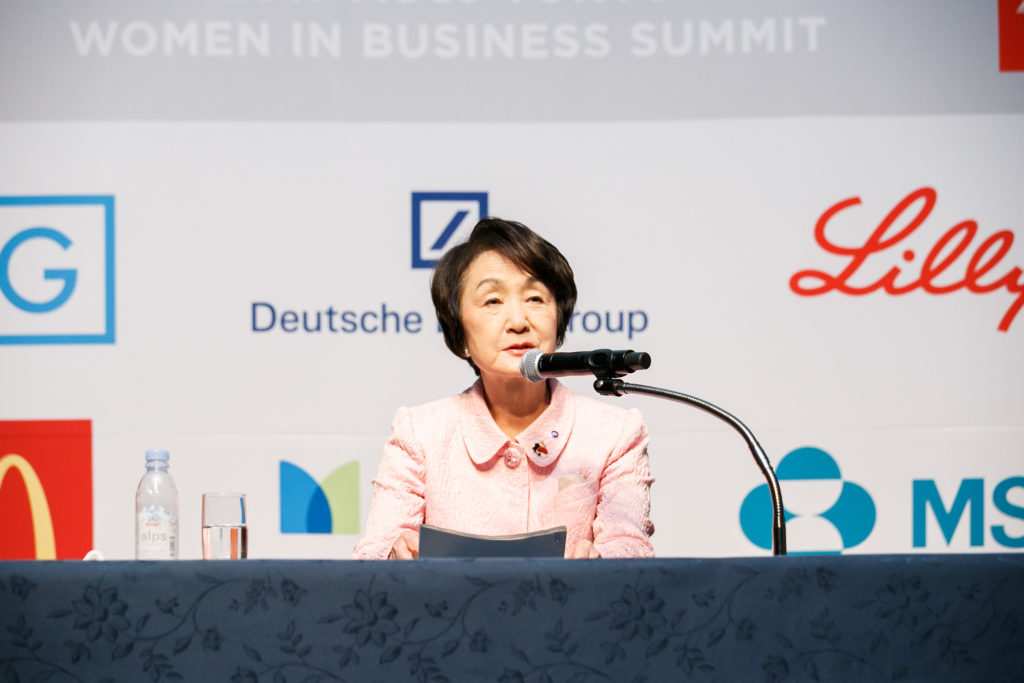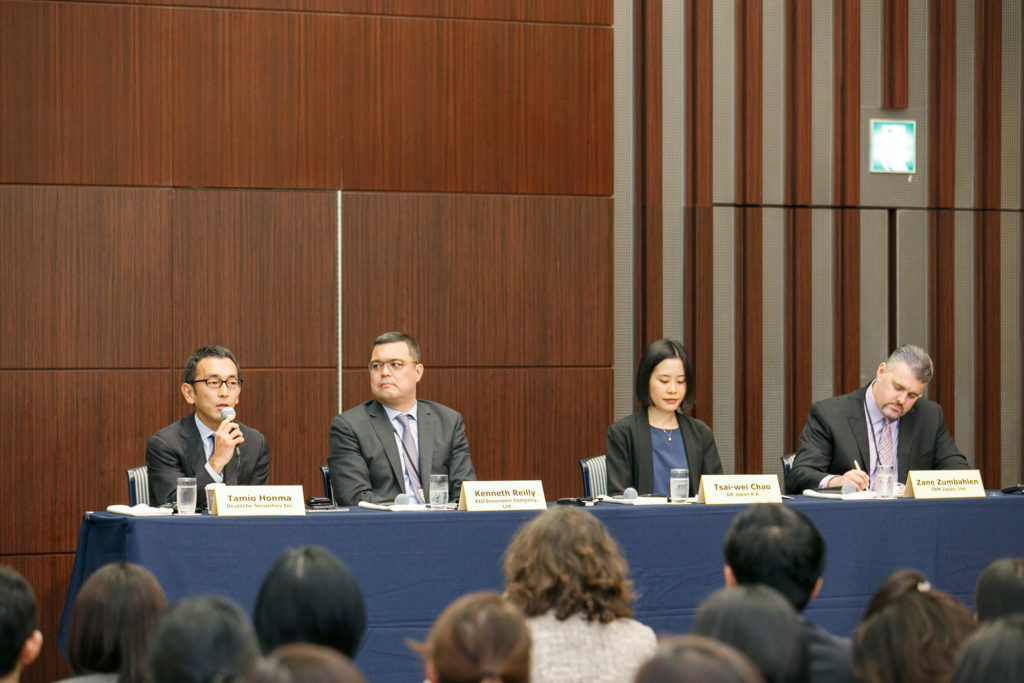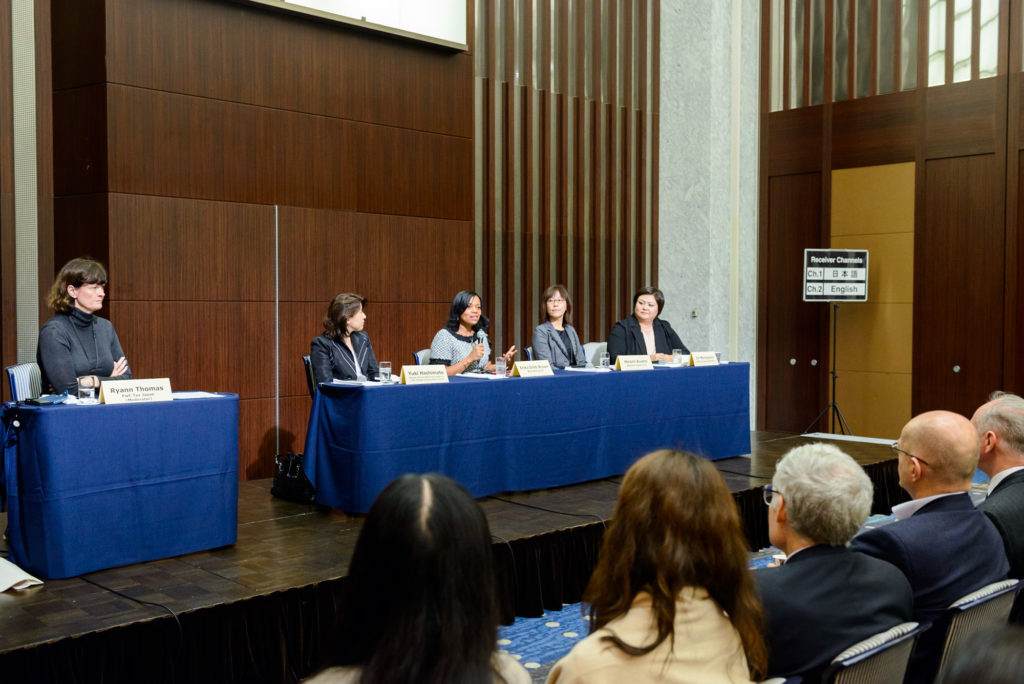Women In Business Summit 2017: Tackling Traditional Corporate Culture
Summit drives change for working women in Japan
“Breaking the Mold” was the theme of this year’s American Chamber of Commerce in Japan Women in Business Summit, which drew more than 500 delegates to central Tokyo on October 17th.
Hailing from industry, government and academia, attendees were joined by 50 business leaders and diversity and inclusion champions who spoke in panel discussions and training sessions.
The event was the chamber’s third women in business event to be held in 2017, following successful gatherings in the Kansai and Chubu areas, which ACCJ President Christopher LaFleur said reflects the growing recognition that the role of women in the economy is “of utmost importance to our lives.”
With the aim of delivering actionable takeaways that would help delegates overcome Japan’s traditional corporate culture and achieve professional success, the event called on those present to share issues, raise concerns and propose solutions to further women’s empowerment in Japan.
Savvy Tokyo went along to find out more.
 © Photo by Life.14
© Photo by Life.14
Use your network
Elizabeth Handover, president of Lumina Learning, opened the summit by saying that a diverse audience means more ideas and viewpoints.
“We all have a story; we all have an experience. They are all valuable,” she said, encouraging delegates to share their thoughts for the benefit of all.
Keynote speaker Fumiko Hayashi, mayor of Yokohama, echoed her words, pointing out the opportunities to be found in meeting a wide range of people.
“Talk to as many people as possible and make one-on-one relationships with them. With time your networks will grow. My career has been possible only because of doing that,” she said. “Since leaving high school I’ve worked at nearly 20 companies and it was the relationships I made at each of them that have supported me.”

Fumiko Hayashi, mayor of Yokohama, speaks at the Women in Business Summit on October 17, 2017.
Though now recognized by The Wall Street Journal, Forbes and Harvard Business School among others as one of the most powerful women in the world, Hayashi said her career didn’t look promising at the outset. Like most companies did in the 1960s, one former employer even suggested she worked for five years and then resign, to have children. Yet she persevered, becoming first the only female car salesperson in Honda and then rising through the ranks to take the position of an operating officer for Nissan Motor Company in 2008, before moving into politics a year later.
Confidence for mothers
Hayashi’s work now involves supporting women in Yokohama to stay in or return to work after having children or to take management positions.
At present, almost every pre-elementary school child in Yokohama has access to a day-care place, and the proportion of women in managerial positions has increased from 8% in 2009 to 14.8% in spring 2017, while those sitting management qualifications has risen from 6.2% to 20.7% over the same period.
“Women see that those in management are really busy and it puts them off wanting to be managers,” she said. “First, we talk to women about the importance of these roles before encouraging them to take the necessary qualifications.”
The need for women to receive training or mentoring to help them reach their potential at work was also addressed in a discussion on returning to the workforce.
As traditional Japanese firms often don’t hire people with extended gaps in their career history, women can find it hard to ever return.
Miwa Tanaka, co-founder and co-CEO of Waris Co., Ltd., which supports women to return to work, said that half of women in Japan currently quit their job after having a baby. As traditional Japanese firms often don’t hire people with extended gaps in their career history, women can find it hard to ever return. Struggling to find their role, these women need training to give them back their confidence.
Yoko Kato, a director at Edelman Japan K.K., returned to work after five years in the UK as a full-time expat mom. She accepted a role “six notches below” her last one but saw it as a “test” and recommended delegates to “take anything that looks interesting and has potential.”
Tanaka agreed: “If you don’t start somewhere, you won’t be going anywhere; your first job [on returning to work] is not your destination.”

“Ikuboss” and “ikumen” panelists discuss the importance of encouraging flexible working hours for fathers.
At a session on ikuboss (employers who support parenting) and ikumen (dads who are active in parenting), panelists pointed out that encouraging flexible working and the taking of paternity leave would also help moms to stay in or return to employment after having children.
Meanwhile, during a discussion on inclusive leadership, Keiko Hayashi, partner at Deloitte Tohmatsu, said that managers should show transparency about why they leave work on time, for example, to pick up their children or help their partner. Doing so sets a good example for others to do the same.
Build your brand
Jin Montesano, executive officer of LIXIL Group Corporation, told delegates that the key to building and reinforcing a successful personal brand is not only one’s IQ (intelligence quotient) but also one’s EQ (emotional quotient). This EQ is necessary to understand what is happening in the organization, such as “people politics.”
She encouraged delegates to look beyond their job title and consider how they, as individuals, can add value to situations.
“Build your personal power regardless of your positional power,” she said, adding that one’s personal brand acts as “insurance” to help secure future professional opportunities.

Panelists discuss the importance of building women’s personal brands at their workplace.
If each delegate’s skills were to be represented on a starburst chart, Montesano said the chart should look like “a star.” As each of its points represents a skill that the person excels at, he or she could be easily differentiated from others and would, therefore, attract opportunities. She warned against trying to be good at everything — which would result in a “rounded” chart — rather than being excellent at something. It is more likely that, when looking for management or board level staff, people will remember and seek those with a particular skill rather than an all-rounder, she said.
Yuki Hashimoto, managing director of Morgan Stanley, added that women need to know their strengths and weaknesses; to like themselves; and to be connected internally and externally in order to develop their brand and build a successful career.
In addition to other practical sessions featuring personal development and training on unconscious bias, delegates joined panel discussions covering topics such as entrepreneurship, workstyle reform, an ageless workforce, inequality in HR systems and leveraging inclusion for innovation.
Savvy Says…
While the range of topics was vast, thanks to solid success stories and insight from leaders with proven success in breaking Japan’s traditional corporate mold, each session had two clear takeaways: women should awaken the power within themselves for self-development and maximize professional opportunities that can be gleaned from collaboration. What we can all do to make this feasible is take small steps in our own working environment: continue raising your voice and ask for your rights.











